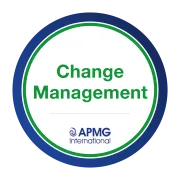
Agile Change Agents to the rescue!
Effective change management and Agile working require building a broad network of people who can initiate and support change processes. They understand the need for change and have the competences necessary to effectively support people in implementing new solutions.
These individuals come from different levels of the organisation, performing different tasks on a daily basis. They include leaders, heads of organisational units, domain experts, specialists, project team members, consultants... Collectively they can be called Agile Change Agents.
As any good project or change manager will know, implementing change is rarely (if ever!) easy. There are usually a number of hurdles along the journey; challenges which are crucial to tackle effectively if a project or change initiative is to ultimately prove successful.
In this feature, we look at how the Agile Change Agent course tackles some common project and change management challenges.
Agile Change Agents vs planning
Today, planning change is becoming increasingly challenging. On the one hand, there is a need for strategic organisational change planning in every company to help control the chaos and enable project preparation, smooth stakeholder engagement, and an appropriate communication strategy. On the other hand, organisations change so quickly that there is often insufficient time to build long-term visions and coalitions to support them.
Changes must be implemented quickly. Creativity is required as standard ways of doing things often no longer apply. In this situation, leaders need to fully understand the concept of agile change planning at all levels: programs, projects, and simpler initiatives.
The Agile Change Agent workshop introduces the concept of a Roadmap instead of detailed plans. The Roadmap ensures that a change initiative is organised at a high level of generality, with an awareness of its overall purpose. At the same time, it leaves a lot of freedom in the development of the solution and allows for course corrections. The stages of the initiative are therefore successive iterations, ending with the implementation of the working part of the solution that delivers the planned benefits.
The Roadmap can apply to single task, project or a range of projects. It also enables the integration of different methods and best management practices such as PRINCE2, AgilePM, AgilePgM and MSP. In this sense, the Roadmap offers an extremely versatile approach, open to different management methodologies, while enabling agile, incremental planning.
Key Agile Change Agent tools in this area: Roadmap.
Agile Change Agents vs communication
There are several key conditions for Roadmap planning to occur successfully. Faster, more efficient deliveries are not so much the result of more intensive work and great dedication of entire teams, as they are the result of efficient communication. For communication to be efficient, appropriate involvement of all participants in the change initiative is required. Without involvement there will be no success, but it is also difficult (if not impossible) if you try to achieve it only from a position of authority; giving instructions rather than constructively engaging with team members and other stakeholders.
The involvement of all participants is a fundamental principle with agile approaches and initiatives. Therefore, effective communication is more than just comprehensive information. It is a whole system of management, strengthening internal motivation in the team to participate in changes, as opposed to having changes imposed on them.
The role of an Agile Change Agent is to work with people - at all levels of the change initiative - by actively listening and promoting a culture of feedback. A manifestation of building effective communication is integrating change initiatives with well-understood business goals.
Key Agile Change Agent tools in this area: Business Case; Change Management Strategy; Change Management Plan; Communication Plan; Active Listening, Feedback.
Agile Change Agents vs. resistance to change
If change initiatives are well-founded and projects make sense from the perspective of their participants, the likelihood of successfully managing resistance to change increases. However, it is important to remember that this resistance is, to some extent, human nature. An Agile Change Agent understands naturally occurring resistance and is able to offer support to those experiencing change.
Successful agents for change must be familiar with basic learning concepts as organisational change can continually force participants (customers or colleagues) to adapt to new situations and continually learn new ways of doing things. This involves stepping out of one's comfort zone, giving rise to a periodic sense of decline in effectiveness and confidence levels.
The role of the Agile Change Agent in preparing people to deal with these periodic states is invaluable. In an environment that allows risk-taking, accepting the possibility of making mistakes, the willingness to use one's own creativity and innovation, performance is often much greater. It is precisely this attitude and working atmosphere that enables some organisations to adapt more effectively in response to the pressure of frequent changes in the environment.
Key Agile Change Agent tools in this area: Active Listening; Feedback.
Agile Change Agents vs Collaboration
If we want a change initiative to change course in a way that allows it to continually maintain alignment with business goals, we need to invite stakeholders to collaborate on continually reviewing original assumptions and confronting them with the changing needs of the organization.
These stakeholders range from those who benefit from the change to those who are actively working on the solution, or who simply need to change their own ways. It is wise to take a broad approach to working with all areas that will be affected by the outcomes of the change. The invitation to collaborate can be done by making extensive use of feedback and by ensuring options for regular and continuous dialogue.
The role of leaders is also changing, from a top-down approach to creating conditions for empowered teams & individuals whilst ensuring relevant and necessary support is available. For many organizations this requires a complete re-evaluation of the management approach, from one that is prescriptive to one of empowerment that supports creativity and innovation. The Agile Change Agent is a role that perfectly understands these conditions and has the competencies of a facilitator and coach.
Key Agile Change Agent tools in this area: Prioritization of Requirements - MoSCoW; Benefits Identifying Questionnaire; Community Map; Motivation Questionnaire.
Agile Change Agents vs Stakeholder Engagement
The quintessential role of an Agile Change Agent is to effectively engage stakeholders in change initiatives. The quality of this engagement often determines the effectiveness of the solution and/or change being implemented. A high degree of sensitivity is needed, as a group of stakeholders can have differing requirements and perspectives. On one hand you should not expand this group too much, but on the other hand you need to ensure all relevant stakeholders are effectively engaged and adopt the most appropriate strategies.
Selecting an appropriate engagement strategy starts with conducting a stakeholder analysis, classifying stakeholders, and finally proposing the appropriate (and necessary) approach to communication and engagement.
Agile Change Agent tools in this area: Personal Assessment; Emotional Response Questionnaire; Personal Leadership; Self-Control; Empathetic Communication; Sustaining Environment.


